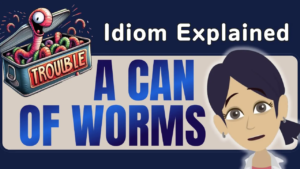That sensitive topic everyone avoids? That’s the perfect ‘hot potato’ nobody wants to handle.
A controversial or sensitive issue that people avoid discussing or try to pass responsibility for to someone else.
Ever encountered the phrase “a hot potato” and felt puzzled by its meaning? You’re not alone.
For many learners, this idiom seems baffling, especially when it suddenly appears in everyday conversations.

Once understood, it adds depth and nuance to your English.
In this blog, we’ll explore the definition, usage, and real-life examples, helping you recognize and use this expression confidently.
Understanding “A Hot Potato”
The idiom “a hot potato” refers to a topic or issue that is difficult or uncomfortable to handle. People often avoid it or try to pass it on quickly because it feels risky or controversial.
This expression comes from the literal image of handling a freshly baked potato. When it’s too hot to hold, your instinct is to toss it away so you don’t get burned.
Likewise, in a discussion, a hot potato can spark awkwardness or conflict, prompting everyone to sidestep or shift focus.
The Definition of “A Hot Potato”
- Controversial Subject: A topic that triggers debates or uneasy reactions.
- Uncomfortable Issue: A point so sensitive that people tend to avoid it, much like a steaming potato you’d drop to protect your hands.
Real-Life Scenarios
Imagine a workplace meeting where budget cuts are on the table. Once layoffs are mentioned, everyone shifts uneasily—this discussion becomes a hot potato.
Alternatively, picture a family gathering where someone brings up a polarizing political viewpoint. You can almost feel the tension rise as relatives try to sidestep the topic, hoping it fades away.
A Memorable Metaphor
Visual aids can strengthen your grasp of idioms.



Imagine holding a steaming hot potato—too hot to handle! That’s exactly how tricky topics feel in conversations.
This mental image mirrors how people handle tough discussions. They might drop the subject, pass it to someone else, or avoid it altogether to prevent getting “burned.”
If you’re ever at a social event and someone utters, “That’s a hot potato,” don’t imagine side dishes. Realize it’s a shorthand way of saying, “This topic is touchy—let’s be careful or change course.”
An Illustrative Story
Consider a casual family dinner. Everyone is enjoying friendly banter until a sensitive topic, like inheritance, emerges from nowhere.
Suddenly, the mood shifts. Cousins glance at each other, and relatives look for an easy exit from the conversation.
One uncle, trying to steer clear of conflict, quickly asks, “Who’s ready for dessert?” He’s effectively passing the hot potato—tossing the topic aside before it roasts the entire table.
Afterward, they all chuckle at how quickly they danced around the potential argument. This story highlights what makes a hot potato so “hot”: once it surfaces, it demands delicate handling or swift diversion.
Cultural Equivalents & Fun Facts
- Origins in the 1800s: The phrase “a hot potato” surfaced when potatoes were common staples.
Handling one straight from the oven is hard, which vividly symbolizes dealing with uncomfortable topics. - Global Variations: Different cultures have their own ways of describing delicate issues.
In English, “a hot potato” is standard, but other languages use phrases that evoke similar images. - Fun Twists: The saying “drop someone like a hot potato” means to abandon someone quickly.
If a relationship becomes burdensome, you might hear, “He dropped her like a hot potato,” indicating abrupt disassociation. - Note on French Usage: As mentioned, the direct French equivalent is “une patate chaude.”
The idea is the same: nobody wants to keep holding onto something that might cause discomfort or conflict.
Practical Examples
It helps to see how this idiom works in everyday language. Below are a few examples, followed by clearer rephrasing.
- “The issue of budget cuts became a hot potato at the office.”
- Rephrased: “When they brought up budget cuts, everyone felt uneasy.”
- Rephrased: “When they brought up budget cuts, everyone felt uneasy.”
- “Her suggestion about restructuring the team was treated like a hot potato.”
- Rephrased: “No one wanted to address her restructuring idea.”
- Rephrased: “No one wanted to address her restructuring idea.”
- “Mentioning politics at dinner turned into a real hot potato.”
- Rephrased: “People quickly avoided that sensitive debate.”
- Rephrased: “People quickly avoided that sensitive debate.”
- “The CEO passed the hot potato of salary cuts to the finance department.”
- Rephrased: “The CEO dodged responsibility for delivering the news.”
- Rephrased: “The CEO dodged responsibility for delivering the news.”
- “When asked about his secret ingredients, the chef held onto them like a hot potato before changing the subject.”
- Rephrased: “He awkwardly avoided revealing any details.”
By learning to recognize these scenarios, you’ll notice the idiom whenever a challenging topic comes up. This awareness will also help you steer conversations in a calm, assertive manner.
Similar & Opposite
Similar Expressions
- “A can of worms”: Refers to an issue that, once opened, leads to complicated problems.
Think of it like opening a sealed container and releasing countless wriggling questions. - “A sticky wicket”: Borrowed from cricket, it’s a tricky situation where things can get messy fast.
Much like a muddy playing field that complicates every move. - “A hornet’s nest”: Poking this nest results in chaos.
In conversation, it points to stirring up trouble that was best left untouched.


Opposite Expressions
- “A piece of cake”: Suggests something that’s very easy.
Like enjoying a slice of cake without any hassle. - “A breeze”: Conveys effortlessness.
Picture a mild wind on a pleasant day—nothing straining. - “A walk in the park”: Another way of saying something is simple.
It evokes a calm, leisurely stroll with no pressure.


These contrasts emphasize how “a hot potato” stands on the opposite end of comfort or simplicity. Where “a piece of cake” signals ease, “a hot potato” hints at tension or potential conflict.
Related Idioms
Broadening your idiom repertoire is a great step to fluent expression. Below are a few that share thematic links with “a hot potato.”
- “To pass the buck”: When you shift responsibility to someone else, you “pass the buck.” It’s like saying, “This is your problem now.”
- “To sweep something under the rug”: If you hide a problem instead of addressing it, you’re sweeping it under the rug. This can backfire if someone later peeks beneath that rug.
- “To bury the hatchet”: This means making peace or settling a conflict. Instead of letting a subject become a hot potato, you choose to resolve it.
- “To open a can of worms”: You ask one question, and suddenly a host of issues emerges. It’s related to “a hot potato” in that both idioms warn about the complications of uncomfortable topics.
Pop Quiz: Check Your Idiom Skills
Hot Potato

Memory Aids
To remember “a hot potato,” imagine a real hot potato in your hands.



It’s so scorching that you have to pass it quickly before you get burned.
This vivid image helps you recall the feeling of handling a risky topic. When you hear this idiom, you’ll instantly know it points to something everyone tries to avoid.
Key Takeaways:
- A hot potato is any subject that causes discomfort or conflict.
- People either dodge it, shift blame, or swiftly change the conversation.
- Whether in a boardroom or at a dinner party, recognizing a hot potato can save you from awkward or heated debates.
Keep practicing idioms like “a hot potato,” and soon, these expressions will feel natural. You’ll navigate sensitive discussions with confidence, and your English fluency will shine in every conversation you join.









Comment